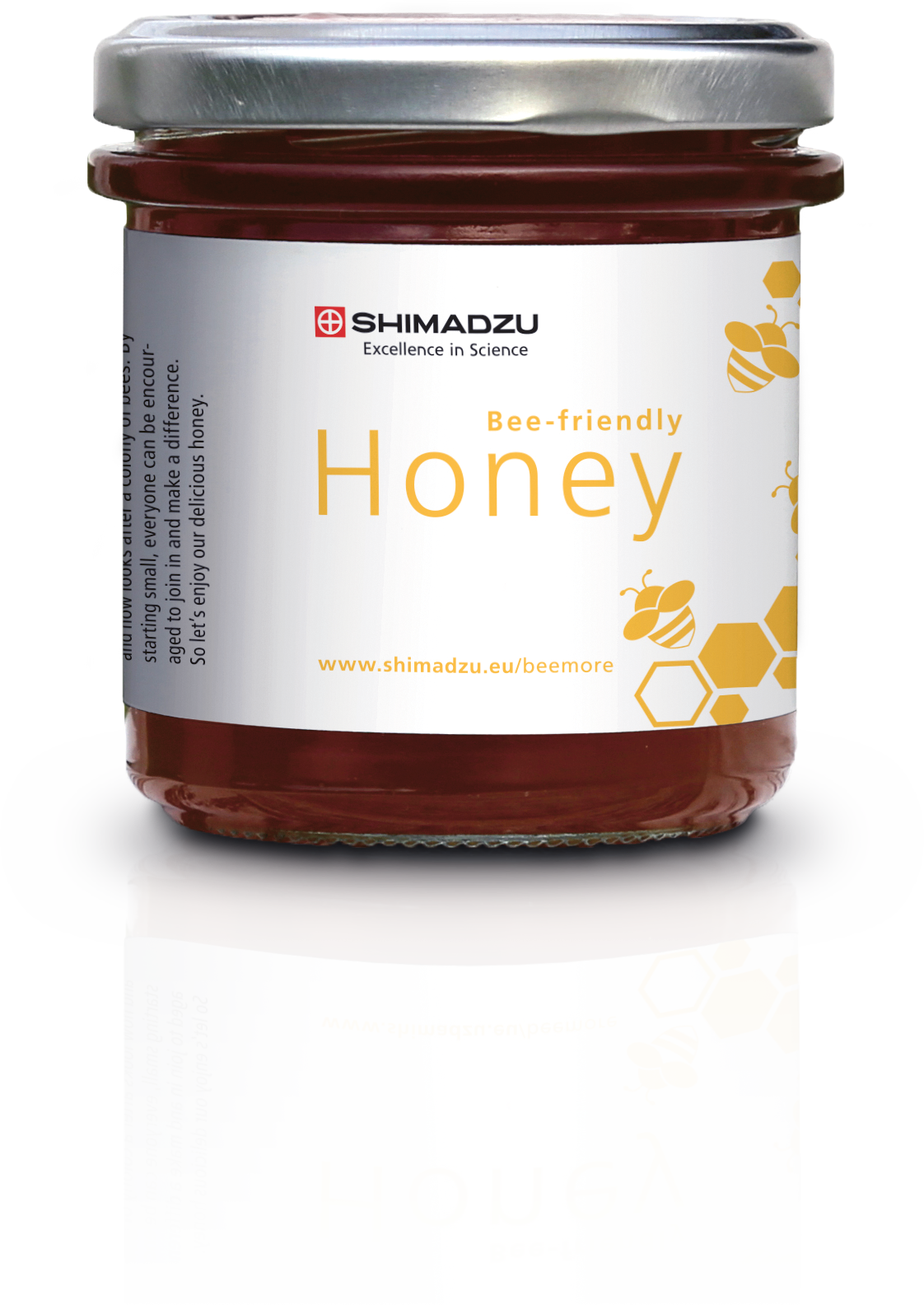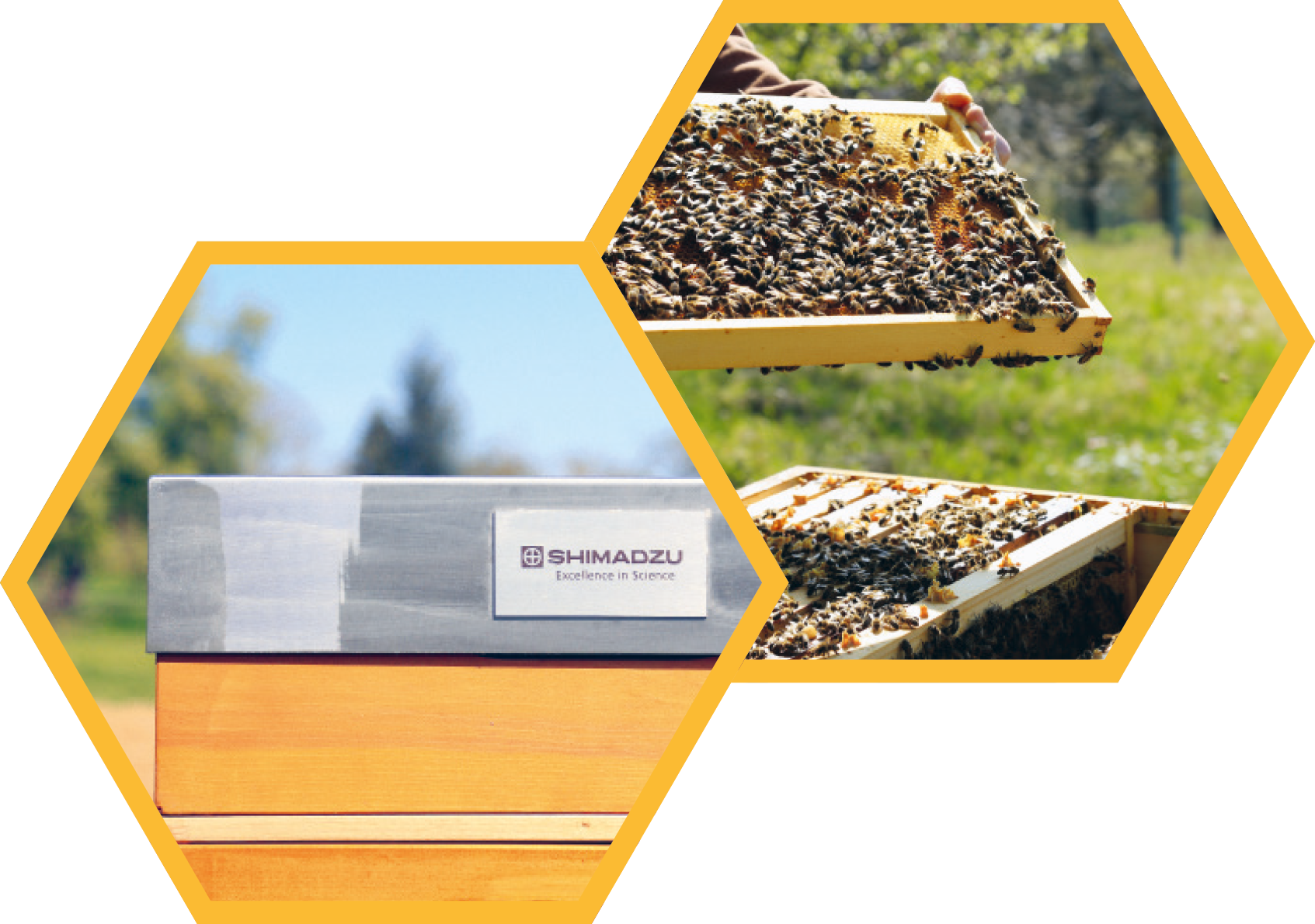The bees are on the loose
Working for the environment and nature conservation with beeswe.love
There are almost 600 different bee species in Germany. About half of them are now on the brink of extinction. Pesticides, vermin and lack of food are just some of the reasons why. With beeswe.love, a beekeeping project, Shimadzu actively supports species protection.
Insects form the basis of a functioning ecosystem. They pollinate more than 85% of all plant species, including many that are essential for humans as food suppliers. Without insects, flowers would have to be pollinated by hand and the ecosystem, on which humans and animals depend, would gradually collapse.
Of bees and blossoms
Bees are among the world’s most important pollinators and are therefore a critical factor in agriculture. With their pollination activity, their economic significance amounts to about $265 billion per year. According to the World Bee Day organization, crops that rely on pollination have tripled in the last 50 years. These include plant species that produce fruits, vegetables, seeds, nuts and oilseeds. Bees and their pollination not only increase the quantity of agricultural products, but also improve their quality and resistance to pests. And with more bee and insect colonies, the Earth’s biodiversity increases. However, monocultures, the use of pesticides, diseases and parasites endanger the diversity of bee colonies. Half of all bee species are facing extinction.
Of bees and blossoms
Bees are among the world’s most important pollinators and are therefore a critical factor in agriculture. With their pollination activity, their economic significance amounts to about $265 billion per year. According to the World Bee Day organization, crops that rely on pollination have tripled in the last 50 years. These include plant species that produce fruits, vegetables, seeds, nuts and oilseeds. Bees and their pollination not only increase the quantity of agricultural products, but also improve their quality and resistance to pests. And with more bee and insect colonies, the Earth’s biodiversity increases. However, monocultures, the use of pesticides, diseases and parasites endanger the diversity of bee colonies. Half of all bee species are facing extinction.
Working together for a healthy ecosystem
Shimadzu is actively committed to protecting biodiversity, a responsibility that each individual can take on. In a joint beekeeping project with
With the Shimadzu bees, almost 100 sqm of bee pasture is created. This natural meadow provides living space for a variety of animals, insects and plants. And on top, the busy bees also produce Shimadzu honey.
The bee colony is set up by beekeepers, who tend to and care for the bees. In the bee pasture, different plant species such as snowdrops, sunflowers, mallows or phacelia, also give other insects a new home. The flowers attract both bees and bumblebees, which diligently collect nectar. The resulting honey is harvested, centrifuged and filled into jars. In 2020, it was possible to collect both early and summer harvests. In the winter months, the Shimadzu bees went into their well-deserved hibernation.
The bee initiative in France
To mark #WorldBeesDay, not only Shimadzu in Germany but also the French subsidiary Alsachim took in a total of three bee colonies on their own premises. Together with the local beekeepers’ association Asapistra, the company’s employees take care of the bees and their hives. Asapistra was founded in 2008 by the initiative of young beekeepers in Strasbourg with a large number of local members. The organization’s goal is to draw attention to the preservation of biodiversity through targeted actions to ensure a healthy ecosystem.
The beekeeping projects with beeswe.love and Asapistra are examples of Shimadzu’s philosophy of responsibility towards the environment and people. The company’s technologies are used in a wide range of sectors. Especially in the food industry and agriculture, they serve consumer and environmental protection as well as product safety.
Because: Together we can #beemore
Check out the latest information and recent developments of the Shimadzu bees on the Shimadzu websites.
Change begins on a small scale
Making your own garden or balcony bee- and insect-friendly is easy. Here’s how it works:
- Wild perennial buffet:
Wild perennials, also called bee pastures, are the ideal food source for insects. For a stable nectar supply throughout the year, a smart planting of early-, mid- and late-flowering species is essential.
Suitable species are: borage, buckwheat, nasturtium, catmint, mallow, marigold, sunflowers - Herbs for humans and animals
Bees love herb gardens; they are easy to plant on the balcony. Wild bees enjoy sage and thyme, for example, but lavender, oregano, mint and lemon balm are also popular. This way, the bees are cared for and humans also have fresh herbs for cooking.
Important: When harvesting, do not cut off too much, and leave the blossoms. - Perennials and trees as nectar sources
In particular, native deciduous trees such as maple, sloe, chestnut and lime trees offer an abundance of nectar. Orchards also benefit from insects, as fruit quality depends on pollination by bees, as does the size of the harvest. Apple trees are considered to be particularly bee friendly. - Wild plants for the urban jungle
Doing something good can be so simple: even a windowsill with flowers provides bees with an important food source. A balcony with wild plants is even better. They are hardy, easy to care for, fragrant and beautiful to look at!
Suitable plants are: dandelion, seed sparrow, sweet clover, aster, troll flower, small winter lily, marguerite, lavender, flour sage. - Beneficial insects instead of chemicals
Not even the bee-friendly plants are protected from pests. And almost all types of poisons are lethal for the garden and balcony. A natural way to control parasites is to use beneficial insects such as ladybirds, lacewings, ichneumon flies or predatory bugs. Natural plant protection products can also be useful.

